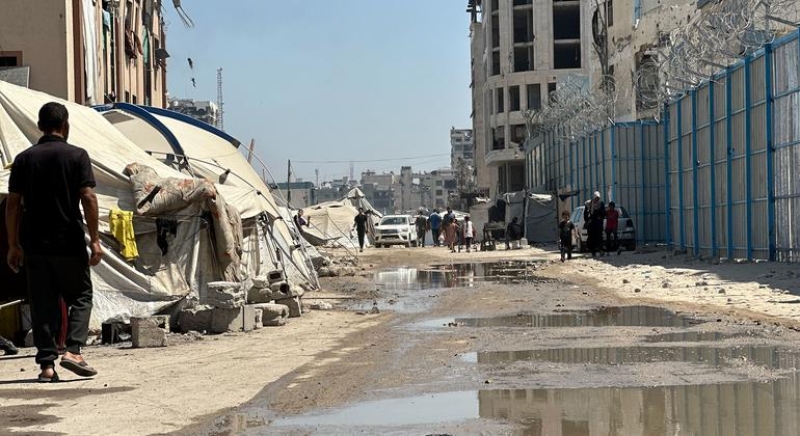- Bangladesh stocks end week higher on upbeat mood |
- BDR name will be restored, army won't be used for politics: Tarique |
- Hili land port highway upgrade delayed again, cost Tk 588cr up |
- Tarique vows quick execution of Teesta Master Plan if elected |
- How Undecided voters May Decide the Election |
Global Crises: Gaza Strikes, Sudan Killings, Rohingya Plea

With the war intensifying in Gaza City, things are getting worse.
As the Israeli military offensive in Gaza City intensifies, the UN and its partners continue to warn of catastrophic consequences for civilians.
Multiple strikes overnight into Friday were reported in the Jabalya Al Balad and An Nazla neighborhoods, the UN Office for the Coordination of Humanitarian Affairs (OCHA) said in its latest update.
As a result, around 900 people reportedly fled towards the Sheikh Radwan neighborhood and western Gaza City.
The UN and its partners again reminded the parties to the conflict of their obligation to protect civilians in line with international law—including humanitarian workers and those who cannot or choose not to move.
“Those fleeing must be allowed to do so safely. They must also be allowed to return if they wish to, as the situation allows,” OCHA said.
The agency underscored the need to ensure people have access to aid and basic services, whether they leave or stay.
Supplies must also be allowed to enter the Gaza Strip through all available crossings and corridors, and humanitarians must have safe, predictable, and sustained access to deliver aid at scale.
Meanwhile, as strikes intensify across the enclave, casualties are overwhelming hospital emergency departments.
Humanitarians warned that the expansion of military operations would further cripple the already collapsing healthcare system.
Nearly half of all hospitals and field hospitals are located in Gaza City, accounting for about 40 percent of the bed capacity in the entire enclave. Additionally, many medical facilities in the south are operating at several times their capacity.
Humanitarians stressed that access to healthcare must be immediately restored to prevent further avoidable deaths.
Recent brutal attacks by the paramilitary Rapid Support Forces (RSF) in Sudan have left at least 89 people dead in North Darfur state, the UN human rights office (OHCHR) reported on Friday.
The RSF has been battling the Sudanese Armed Forces (SAF) for control of the country for more than two years.
OHCHR stated that RSF attacks on the besieged North Darfur capital, El Fasher, and the adjoining Abu Shouk camp for displaced people resulted in at least 89 civilian deaths, though the actual number could be higher.
The attacks occurred over a 10-day period ending on 20 August.
At least 32 civilians were killed in attacks between 16 and 20 August, while 57 others were killed in earlier attacks on 11 August.
OHCHR was particularly horrified that 16 of the most recent killings appear to have been summary executions, according to spokesman Jeremy Laurence.
“Most of the victims were killed in Abu Shouk camp and belonged to the African Zaghawa tribe,” he said.
“In another case in the El Fasher area, a victim was asked which tribe he belonged to. He was killed after responding that he was from the African Berti tribe.”
Meanwhile, the humanitarian situation in El Fasher has reached a critical stage after more than a year of siege, and the risk of famine is growing in the city and other areas of North Darfur.
OHCHR also condemned two separate attacks on UN humanitarian convoys in North Darfur in recent months, saying such incidents worsen the human rights situation for civilians.
The UN human rights office has renewed its call to end impunity for violence against the Rohingya in Myanmar and to ensure their rights to security, citizenship, and equality.
It said the Rohingya—a mostly Muslim minority community in predominantly Buddhist Myanmar—continue to suffer, eight years after a deadly military crackdown.
More than 700,000 fled to Bangladesh following the assault that began on 25 August 2017, joining others who had fled in previous waves.
OHCHR emphasized that ending impunity and ensuring the Rohingya’s rights are critical for breaking the cycle of violence.
The Rohingya mainly reside in Myanmar’s Rakhine State, where the human rights and humanitarian situation has sharply deteriorated since November 2023, further worsening already life-threatening conditions.
OHCHR urged the international community to increase humanitarian funding to meet basic needs, ensure essential services, and promote accountability.

